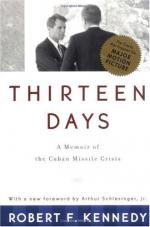
|
| Name: _________________________ | Period: ___________________ |
This test consists of 5 multiple choice questions, 5 short answer questions, and 10 short essay questions.
Multiple Choice Questions
1. Who was concerned about how the U.S. would convince the rest of the world that the blockade was necessary and legal?
(a) The French President.
(b) The Prime Minister of Canada.
(c) The leaders in OAS.
(d) The Chancellor of West Germany.
2. Who sent messages praising Russia and castigating the U.S.?
(a) Ted Sorensen.
(b) David Ormsby Gore.
(c) Bertrand Russell.
(d) Fidel Castro.
3. How long before the President's address to the nation did they tell the ambassador of Russia?
(a) Twelve hours.
(b) Five minutes.
(c) One day.
(d) An hour.
4. What did Ex Comm believe would happen if they put a blockade around Cuba?
(a) Cuba would give up.
(b) Russia would use nuclear force.
(c) Cuba would bomb the naval fleet.
(d) Russia would put a blockade around Berlin.
5. In the section entitled, "It was now up to one single man," when did JFK hope to broadcast his plan to the nation?
(a) Never.
(b) Monday.
(c) Sunday.
(d) Tuesday.
Short Answer Questions
1. Which group was created "for the purpose of effective conduct of the operations of the executive branch in the current crisis" (45)?
2. What does Robert believe often leads to war?
3. What was one requirement of the blockade plan?
4. On October 18th, photographs showed what disturbing new information?
5. In the section "Tuesday morning, October 16, 1962 . . .," why were initial reports of missiles in Cuba not passed on to the President?
Short Essay Questions
1. Which countries immediately supported the U.S. in the decision for a blockade? Why did JFK favor a blockade over a surgical air strike?
2. How does Berlin factor into the decision making about the Cuban Missile Crisis?
3. Why did the Intelligence Community not believe Cuba was a threat to the United States?
4. What information did the Intelligence Community have about the missiles in September, but did not inform the President about at that time? Why were they not passed on?
5. Why does RFK slip the President a note saying "I now know how Tojo felt when he was planning Pearl Harbor" (25)? How do the situations compare?
6. How did the US obtain their information about Russian activity in Cuba?
7. What distinguishes Thirteen Days as a memoir (besides the subtitle) and not just an autobiography?
8. What was one argument for a blockade?
9. When was Congress told, and how did Congress react to the news of the Cuban Missile Crisis?
10. What did Ambassador Dobrynin provide as evidence that USSR would not be a threat to the United States?
|
This section contains 1,293 words (approx. 5 pages at 300 words per page) |

|




